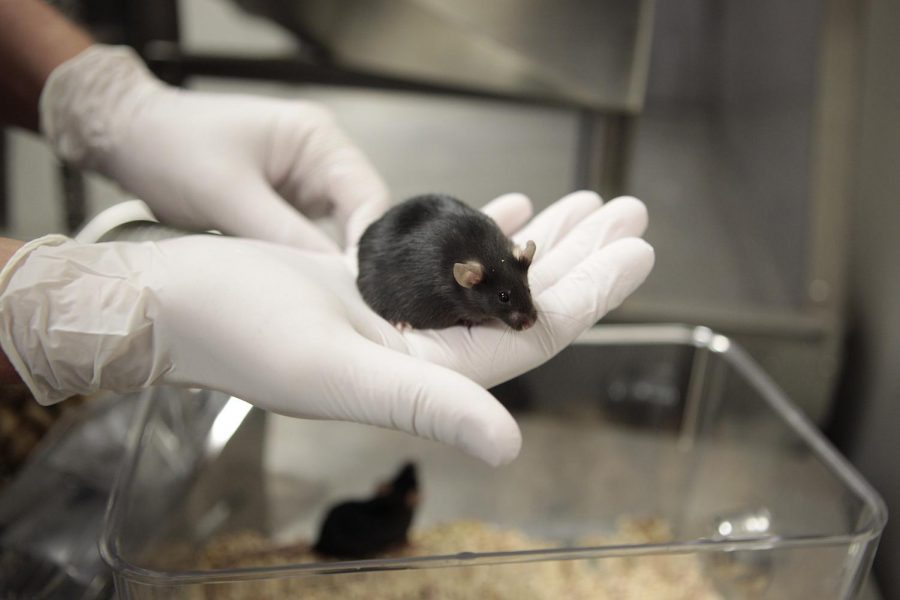Professor studies effects of sleep deprivation using mice
October 28, 2014
Sleep loss is something everyone experiences at some level — almost 25 percent of U.S. citizens are sleep deprived, according to biology professor Noah Ashley.
Ashley examines lack of sleep in mice to research the long-term health effects of sleep deprivation. The research project has been taking place for over a semester.
The animals are used for their docility, habitual breeding and low maintenance. Their behavior is easily observed, making them ideal for physiological studies that cannot utilize humans, Ashley said.
“They’ve really shed a lot of light on how humans work,” he said. “If it wasn’t for mouse research, we’d probably be decades behind on medical advancements.”
Mice are also useful “knockout” models. Researchers can take out a specific gene and observe the effects of sleep deprivation, in this case on animals lacking that gene. The process can be reversed to examine effects of additional genes.
In order to conduct research, the mice are kept awake for various durations of time using the multiple platform method. Half-inch platforms are placed around a cage, keeping the mice from lying down. Water is then poured beneath the platforms, so if they fall asleep, they fall into the water.
Eventually, the tested mice must be euthanized. Tissue is extracted to examine the results of prolonged sleep loss on the organs and genes.
“The goal is to understand the cost of sleep loss and what that can do to the body,” Ashley said.
All protocols are formed to fit policy, and researchers must make proposals to the Institutional Animal Care and Use Committee (IACUC) in order to conduct experiments with animals.
“We have to adhere to certain regulations to make sure none of the animals are suffering,” he said. “They’re well taken care of, and they’re checked on a routine basis.”
The IACUC oversees all research involving vertebrate animals. Approval and training is necessary to begin testing, which includes specifying why and how the animals will be used.
“The committee uses this information to make suggestions if there are any modifications that might minimize effects on the animals, reduce the number of animals involved, or use alternatives to animal involvement,” Philip Lienesch, chair of IACUC, said.
The protocol would not be approved if potential results of the study do not justify animal use. Around 10 to 20 proposals are submitted a year, Lienesch said, so on-campus research involving animals is narrow.
Online training and in-person orientation is required to begin testing, but extensive training is not available on campus due to limited resources and the small amount of animal research, according to the IACUC Policy.
However, faculty are encouraged to attend seminars and learn from experienced animal researchers and their teams on proper, humane animal care and use.
“We really focus on being humane with everything we do with the animals,” Somerset junior David Sams said. “A part of working with the animals is learning how to handle the animal in different situations.”
Sams is beginning an independent study on caffeine affecting inflammation in the heart and the effects it has on sleep loss. Ashley taught him proper animal care if they are found distressed, but ultimately how to avoid stress on the animal.
“Ashley is probably the most knowledgeable individual on campus about regulations covering animal research and animal welfare in general,” Lienesch said.
Research began as Ashley saw those chronically sleep deprived tend to exhibit beginning signs of cardiovascular problems, metabolic disease and an increased risk for obesity and cancer. His study looks at the primary effects behind sleep deprivation causing inflammation.
Whenever the causes are uncovered, research will turn to preventing inflammation, so eventually people will experience no impact from sleep deprivation.
“My lab is interested in looking at the physiological effects of sleep loss and how that can eventually translate into increased risk factors for disease,” Ashley said.




















![Megan Inman of Tennessee cries after embracing Drag performer and transgender advocate Jasmine St. James at the 9th Annual WKU Housing and Residence Life Drag Show at Knicely Conference Center on April 4, 2024. “[The community] was so warm and welcoming when I came out, if it wasn’t for the queens I wouldn’t be here,” Inman said.](https://wkuherald.com/wp-content/uploads/2024/04/smith_von_drag_3-600x419.jpg)


